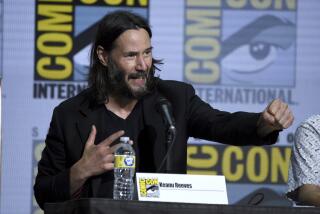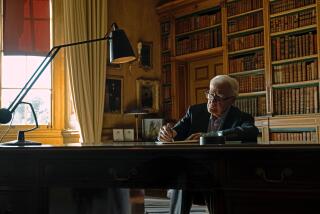John Connolly turns from crime to fantasy
- Share via
IRISH author John Connolly is known for his crime thrillers, notably the Charlie Parker detective series (“Every Dead Thing,” “The Killing Kind”). With his latest, “The Book of Lost Things,” Connolly transcends his usual genre, entering the terrain of fables and fairy tales -- the opening line is “Once upon a time” -- and delving imaginatively into loss, grief and the power of storytelling itself.
Set in London circa World War II, “The Book of Lost Things” follows a 12-year-old boy after his mother’s death from cancer. David, the only child of a loving but preoccupied father, has no source of comfort except the books and stories his mother once loved reading with him.
The traumatized boy soon develops obsessive-compulsive tendencies, convinced that rigidity and routine are essential for survival. David always touches doorknobs an even number of times and is careful to start each morning by putting his left foot onto the floor first. “Perhaps, in sticking to his routines, he had saved his father’s life, even if he hadn’t quite managed to save his mother,” Connolly writes. “Now that it was just the two of them, it was important not to take too many chances.”
Just five months after his mother’s death, David’s father finds a new companion in Rose, whom he eventually marries and has a baby with. When David and his father move into her crumbling house in the English countryside, the boy starts having blackouts. Nighttime is the worst: “[T]he whispers in his head were joined by the sound of the books. He had to put his pillow over his ears to drown out the noise of their chatter, as the oldest of the stories roused themselves from their night slumbers and began to look for places in which to grow.”
David’s primal fears begin to come to life when he discovers thick illustrated volumes of fairy tales in his attic bedroom. They are a kind of portal to a fantastical world, where David hopes to be reunited with his mother. “The choice had been made for him,” Connolly writes. “David could not hesitate. He forced himself through the gap in the wall and into the darkness just as the world that he had left behind became an inferno.”
On the other side he encounters an idealized father figure called the Woodsman, a sinister creature called the Crooked Man, lurking wolf-men called the Loups and a mysterious king who presides over a tome known as “The Book of Lost Things,” whose meaning and power are eventually revealed.
David also unlocks terrible secrets about the fate of the original owner of the magical old books in his room -- Rose’s great-uncle Jonathan, who once lived in the same room and disappeared with a local girl named Anna when he was 14. Jonathan, like David, was a quiet, sad boy who loved books and had violent nightmares arising from the stories he read. Now, as David finds himself stuck in an alternate world of archetypal beasts and monsters, he must find his way back home again. Along the way, such classic fables as “Snow White” and “Little Red Riding Hood” are woven into the story in rather twisted ways. It’s all quite Grimm.
The author doesn’t give his young hero a happily-ever-after ending. (It is quite melancholy indeed.) And this is one of those narratives that seems about to finish a few times -- each of them fine stopping points -- but continues onward until the actual conclusion feels labored and overdue.
Still, “The Book of Lost Things” marks an ambitious turn for Connolly. With his evocative style, he takes familiar themes -- the loss of innocence, the redemptive power of storytelling -- and tweaks them in clever, even perverse, ways. There are stories within stories (the fairy-tale characters become storytellers), blurring the line between David’s life and the imaginary land into which he’s propelled until the realm of fantasy overtakes reality in a powerful, visceral way. That’s apt, given the era in which the novel is set, the disorientation and longing resulting from the war.
In the end, David is transformed by his experience, and Connolly offers readers a moral lesson, albeit a distinctly modern one: Good conquers evil, except when it’s the other way around.
Carmela Ciuraru is the editor of six anthologies of poetry, including “Solitude” and “Motherhood.”
More to Read
Sign up for our Book Club newsletter
Get the latest news, events and more from the Los Angeles Times Book Club, and help us get L.A. reading and talking.
You may occasionally receive promotional content from the Los Angeles Times.







